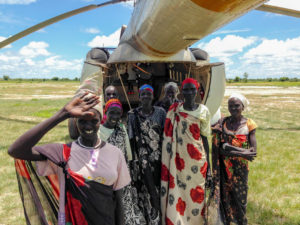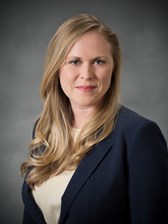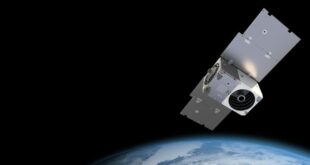
By Krystal Wilson, Director of Space Applications Programs, Secure World Foundation
In September 2015, more than 150 world leaders met at the United Nations Sustainable Development Summit to adopt the 2030 Agenda for Sustainable Development. Building on the successes of the original eight Millennium Development Goals(MDGs), this new agenda officially came into force on 1 January 2016 and includes an ambitious set of 17 Sustainable Development Goals (SDGs) to support economic growth, improve social inclusion, and advance environmental protection. More specifically, they cover the areas of: poverty, hunger, health, education, gender equality, clean water and sanitation, energy, livelihood and economic growth, industry and infrastructure, inequality, cities and communities, responsible consumption and production, climate action, sustainable water resources, sustainable land resources, governance and justice, and global partnerships.
Each goal has specific, integrated targets and indicators to ensure measurable and transparent progress by 2030. Compared to the MDGs, the SDGs are more broadly written to highlight the needs of all countries rather than just focusing on the developing world. By their very designation, they also include a much stronger focus on sustainability: the idea of development that meets the ongoing needs of the present and the future. Another core feature of the SDGs is their focus on how to implement, including the need for strong partnerships, mobilization of financial resources, improved capacity-building efforts, and the importance of technology and data. Though the SDGs are not legally binding, all countries agreed to build out national frameworks for achievement of the goals, including monitoring progress. However, the goals are not meant to be achieved by state action alone and were intended to involve the commitment of many international actors working in a variety of innovative ways. Space-based technologies and data can be a cost-effective way of collecting information about large, relatively unpopulated or difficult to access areas and have already been integrated successfully in many programs on agriculture, water, land use planning, disaster management, and climate change.
In the more than two years since the establishment of the SDGs, professionals from diverse industries have evaluated how to contribute to the implementation and monitoring of the SDGs. The space sector has emerged as one key supporter for those working to advance these goals. This comes as no surprise and was in fact acknowledged in the text of the 2030 Agenda. In paragraph 76, signatories agreed to “promote transparent and accountable scaling-up of appropriate public-private cooperation to exploit the contribution to be made by a wide range of data, including earth observation and geo-spatial information.”
One of the most important space applications for supporting the SDGs is derived from Earth observation satellites. In contrast to some supporting technologies, observation and analysis based on satellite data can be done in a non-intrusive, objective, and repeatable manner, which can provide for more balanced and informed decision-making. Remotely sensed data can safely indicate information about locations that are too difficult or dangerous to access. With the use of elevation and surface models, decision-makers can reconstruct a sequence of events (natural or man-made) and utilize detailed feature extraction for mapping—all critical components of assessment, planning, implementation, and prevention in many SDG-related activities.
Just a small sampling of the current use cases include: emergency mapping, identifying areas at risk of famine, measuring poverty, assessing land degradation, managing endangered wildlife species, analyzing the urban effects of violent conflict, and documenting human rights violations.
Communications satellites also play an important role in supporting the SDGs, providing critical access to many places where sparse populations, difficult terrain, or large distances make it too expensive to install terrestrial systems. Long-distance and emergency communication is possible only with satellite services. They are also critical when disaster or conflict cause ground-based communication infrastructure to be overloaded or damaged. Advanced warning systems usually rely on satellites for providing critical information to affected populations. Satellite broadband technology can even be a way for local users to bypass government internet controls in authoritarian states.
Using space-assets in support of these types of activities is not new, and trends in the space industry and emerging technologies, such as hyperspectral imaging and machine learning, ensure this critical contribution to the SDGs will continue to increase rapidly in the coming years. The growth of the small satellite industry is particularly encouraging in terms of coverage and cost as well as the fact that many start-up companies have made improving conditions on Earth an integral part of their mission. Established companies such as DigitalGlobe and Iridium are also committed to supporting the SDGs and other humanitarian efforts. Better tools and models to understand, locate, analyze, and distribute space-derived data are being developed.
Space infrastructure and assets certainly cannot fix every problem faced by the SDGs, but it is an extremely valuable tool. Despite the already common use of satellite technology and data and the growing potential of the industry to contribute even more, knowledge and use of this technology remains somewhat confined to a subset of development professionals—a situation that needs to be remedied. The space sector needs to continue to expand its support of these ambitious goals.
At the Secure World Foundation, we not only focus on keeping space sustainable but also on maximizing the efficiency and effectiveness of using space for the benefit of humankind including taking a strong interest in promoting the use of space technology and data for the SDGs. The full utility of space technology and data can be blunted by a variety of institutional, policy, educational, and social barriers. As a result, benefits from these systems do not always adequately reach decision makers or ordinary citizens when they need it most. SWF brings together disparate communities – technical, legal, policy – to find ways to improve the use of space systems for human benefit and to develop collaborative measures to address shared challenges.
SWF actively participates in international forums advancing data democracy, international cooperation, and collaboration between geospatial information providers and users, including the Committee on Earth Observation Satellites (CEOS), the Group on Earth Observations (GEO), and the United Nations Platform for Space-based Information for Disaster Management and Emergency Response (UN-SPIDER). SWF focuses on finding new ways to advance the effectiveness of space-derived information and services to improve decision making. As part of this work, SWF has supported capacity-building workshops in developing countries to assist disaster management practitioners in preparing for and responding more effectively to natural disasters. SWF has also looked at specific policy issues such as how citizen science and Earth observation can support efforts associated with the SDGs. Last month, a SWF-sponsored conference on space security held in Geneva, Switzerland featured a speaker from the World Bank who looked at how Earth observation could help tackle poverty-driven security issues. This month, in partnership with the Society of Satellite Professionals International (SSPI) Mid-Atlantic chapter and Planet, SWF sponsored a panel discussion on Earth observation data and decision making. In September, we will be supporting a working group on this topic at the Space Generation Advisory Council’s Space Generation Congress meeting prior to the International Astronautical Congress in Bremen, Germany.
SWF will continue to draw on lessons learned from these and other partner efforts to promote the exchange of best practices and to examine how policy, regulatory, and legal mechanisms can address persisting challenges in expanding the use of these resources in support of the SDGs and other benefits on Earth. We do not promote space sustainability for space’s sake but rather for how it contributes to improving life on Earth. Seeking to support and promote the Sustainable Development Goals are an important part of ensuring that the benefits of space continue to be enjoyed widely and for maximum utility.

Krystal Wilson is a Director of Space Applications Programs at Secure World Foundation and has over 10 years of international and domestic space, public policy, and management experience.
Prior to joining SWF, Ms. Wilson was a consultant at Access Partnership, where she worked with international satellite service providers and other leading technology companies on policy issues related to spectrum management, emergency communications, telecommunications standards, orbital debris, and multilateral processes including representing industry at the Inter-American Telecommunication Commission. She has also served as a project manager at the Tauri Group, a leading aerospace analytics firm, providing research, analysis, strategic planning, and regulatory assessment to government and commercial clients. She led and supported production of NASA’s strategic plans, audits, performance plans, budgets, and annual reports. Her work exposed to the full range of NASA’s Earth observation, human exploration, and aviation programs. In that role, she was also recognized as a key member of a data management team that received the NASA Group Achievement Award.
SpaceWatch.Global is a proud partner of the Secure World Foundation, and the publisher and editors are grateful to SWF for its continued support.
 SpaceWatch.Global An independent perspective on space
SpaceWatch.Global An independent perspective on space




